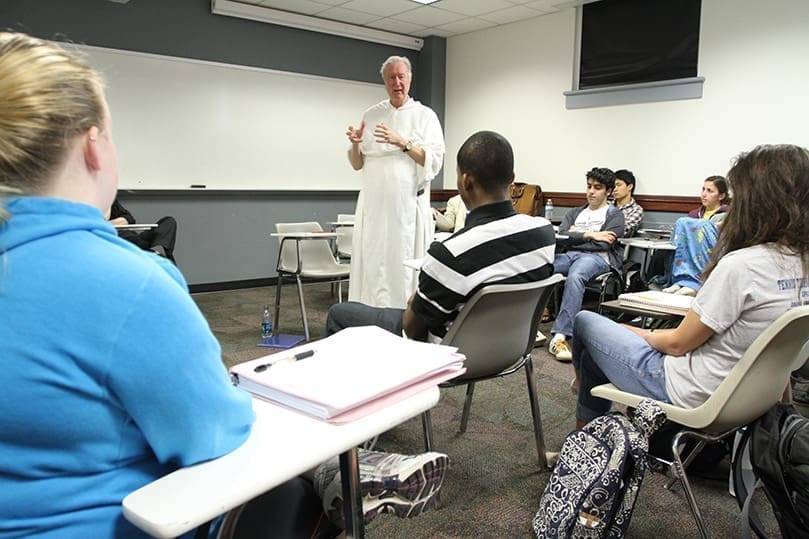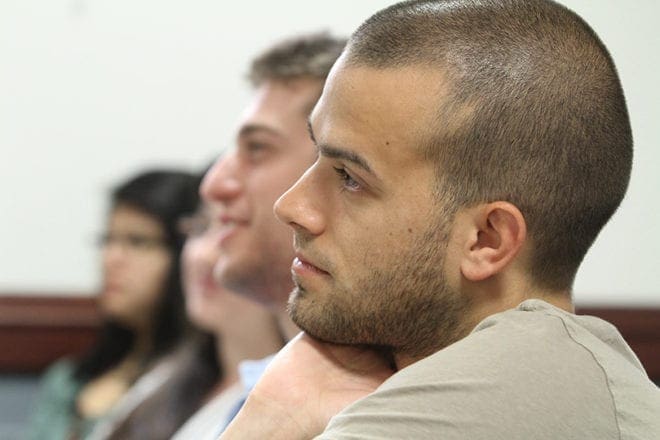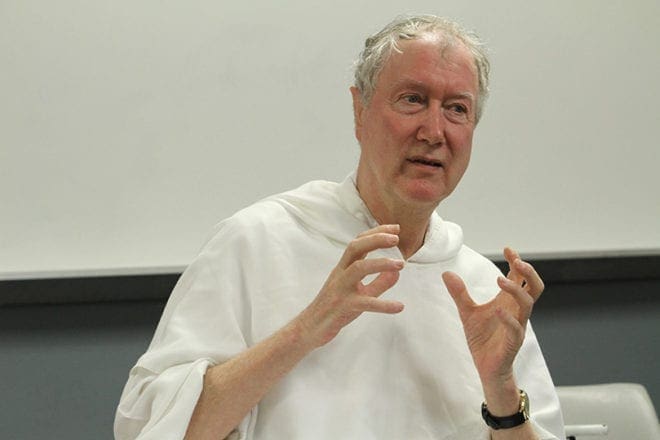 Photo By Michael Alexander
Photo By Michael AlexanderAtlanta
Dominican Sees Vitality In Church Roots, Frontiers
By ANDREW NELSON, Staff Writer | Published April 12, 2012
Father Timothy Radcliffe stood out on the Emory University campus in his white robe, rosary beads looped around his belt, his white hair appearing unbrushed.
He sat in a chair in the Modern Catholicism class, the kind of chair with a small stationary desk, but he stood up to stand closer to students as he answered questions.
With some two-dozen students in the classroom, the former head of the Dominican order talked about Catholic identity. It was clear it wasn’t a typical lecture. At the end, he asked the students for a minute of silence to absorb and contemplate his ideas.
And then, students asked the 67-year-old a variety of questions, from the development of church doctrine to his dealings with then Cardinal Joseph Ratzinger, now Benedict XVI.
Weaving in funny anecdotes with his insights, Father Radcliffe said there is a way for Catholics to discuss complicated contemporary issues by staying faithful to ancient church traditions.
Catholics are people who are rooted, but also leave room for evolution, where “who we are is yet to be discovered,” he said.
“Identity is given, but the exciting thing is it remains to be seen, discovered,” he said.
Father Radcliffe spent a few days on the campus, the guest of the Aquinas Center of Theology and the Candler School of Theology. Well-known in Catholic circles, the British native and award-winning author gave a lecture to more than 700 people on Wednesday, March 28, at the Glenn Memorial Auditorium.
At the lecture, Father Radcliffe said the challenge from atheism to Christianity isn’t the intellectual challenge, but the “imaginative one.”
“Christianity will only be able to flourish in the West if we can engage the imagination of our contemporaries. Atheism does not, I believe, offer us so much an intellectual as an imaginative challenge.”
With poetry, movies, music, Christians can “glimpse” the ultimate end, he said, telling how his father listened to Haydn’s ‘Seven last words’ and Mozart’s Requiem as he lay dying.
“The only way to face death’s threat of extinction is with poetry and music, a tiny glimpse of the creativity of the one who raised Jesus from the dead,” said Father Radcliffe.

(Foreground to background) Seniors Greg Reith, an International Studies major from Philadelphia, Pa., and David Sferlazza, a Finance and Business major from New York, N.Y., listen to Father Timothy Radcliffe as he addresses their Modern Catholicism class. Both young men are Catholic. Photo By Michael Alexander
His talk used the film, “Of Gods and Men,” about the community of Trappist monks killed in Algeria’s civil war to illustrate lessons of self-sacrifice, the effort to aid others, seeing God in everyone.
Like the arts, Christianity cannot be put bluntly, literally, he said. At times, people share the Christian faith but use words that are meaningless to unbelievers or use art as propaganda, he said.
“Art as propaganda is always bad art,” he said.
Instead, the words of faith should take people on a journey.
“We have to discover the truth imaginatively. We have to make a journey towards illumination,” he said.
Just as Jesus asked questions of people, members of the church need to ask questions of the culture and each other.
“Jesus doesn’t give us wrapped up easy answers. He asks questions,” he said.
“Christine doctrine invites us to journey. It provokes us. It carries you on a little farther,” he said.
At the end of the lecture, he fielded a variety of questions about the connection of imagination and wisdom, the role of film in Christian imagination, how shock was used to awaken the apathetic in Christian art, and the alienation of some women in the Catholic Church.
On women in the church, Father Radcliffe talked about his new book about baptism, “Taking the Plunge.”
“We have to reclaim the deepest sense of what it means to be baptized. The Church, above all, is a community who shares in the life of God,” he said. That causes us to “recover the sense of what is the community of the baptized,” he said.
Catholics are not powerless and change can happen, Father Radcliffe said, adding how anger over a disputed visitation of women’s religious orders brought about the change in the head of a powerful Vatican agency.
“Never underestimate your power to change anything,” he said.

Speaking at an Emory class, Dominican Father Timothy Radcliffe said that today we often see a fear of difference and a failure on the part of people to engage in an intelligent debate. Photo By Michael Alexander
On film, Father Radcliffe said the storytelling is at its best showing the ambiguity of life, forcing people to do the work to find answers.
“It actually tries to see people in the messes we are in. God became one of us in the messes we’re in. The best novels and movies explore the ambiguity,” he said.
In the classroom, Father Radcliffe encouraged the students by saying there were no dumb questions.
About divisions in the Church, Father Radcliffe said the members should rely on Church traditions to examine issues of the day. He organized what he called a “disputato,” a tradition from the medieval ages where people with differing views try not to prove the other wrong, but find the fundamental areas where the views converge, he said. The topic was the role of Catholic political leaders in Britain, whether their votes must follow Church teaching. Catholics from across the spectrum were invited, from a prominent Catholic lawyer, the wife of the former prime minister, to members of Opus Dei. The event was a success, he said.
“It is possible to have discussions that surprise you. It takes patience. Can we engage in intelligent debate?” he said. Too often the view is “not to respect my opinion is not to respect me. We have to grow up,” he said. “There is a tendency to be seduced by the culture wars,” when the Catholic tradition is deeper and richer than that, he said.
On engaging young adults, Father Radcliffe said the challenge is to show people the “great adventure” of faith.
“The real problem is indifference. When people go to Mass on Sunday, they yawn,” he said. Catholics need to be exposed to “a little bit of danger” to see what the faith demands, he said.
“People in the end need to see themselves in a drama, an adventure, that in the end may cost them everything,” he said. “We lost the sense of the deep adventure of faith,” he said.
In the audience was David Sferlazza, who graduates in the spring with a finance degree and was raised a Catholic.
“I wasn’t surprised, but I was a little interested in how open he was. He was a lot more open than Catholic leaders are portrayed,” Sferlazza said.
Another listener was Berit Reisenauer, a first-year student. She said Father Radcliffe was very approachable and aware of the everyday issues facing Catholics.
“It was really very reassuring that there are people who are passing on the faith,” she said.